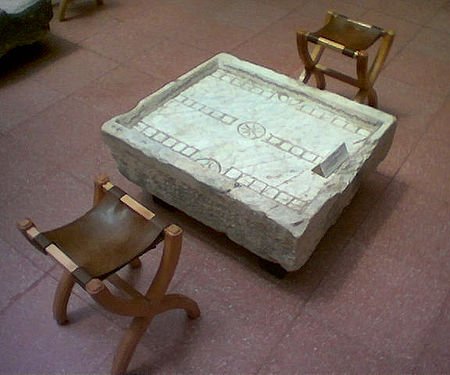Ludus (ancient Rome) on:
[Wikipedia]
[Google]
[Amazon]

 ''Ludus'' (plural ''ludi'') in ancient Rome could refer to a primary school, a board game, or a gladiator training school. The various meanings of the
''Ludus'' (plural ''ludi'') in ancient Rome could refer to a primary school, a board game, or a gladiator training school. The various meanings of the

 ''Ludus'' (plural ''ludi'') in ancient Rome could refer to a primary school, a board game, or a gladiator training school. The various meanings of the
''Ludus'' (plural ''ludi'') in ancient Rome could refer to a primary school, a board game, or a gladiator training school. The various meanings of the Latin
Latin (, or , ) is a classical language belonging to the Italic branch of the Indo-European languages. Latin was originally a dialect spoken in the lower Tiber area (then known as Latium) around present-day Rome, but through the power of the ...
word are all within the semantic field
In linguistics, a semantic field is a lexical set of words grouped semantically (by meaning) that refers to a specific subject.Howard Jackson, Etienne Zé Amvela, ''Words, Meaning, and Vocabulary'', Continuum, 2000, p14. The term is also used in ...
of "play, game, sport, training" (see also ludic
Ludic may refer to:
*Ludic language, a Finnic language in the Uralic language family
* Ludic fallacy, is "the misuse of games to model real-life situations."
* Ludic interface, are types of computer interface that are inherently "playful".
*Ludolo ...
).
An elementary
Elementary may refer to:
Arts, entertainment, and media Music
* ''Elementary'' (Cindy Morgan album), 2001
* ''Elementary'' (The End album), 2007
* ''Elementary'', a Melvin "Wah-Wah Watson" Ragin album, 1977
Other uses in arts, entertainment, an ...
or primary school
A primary school (in Ireland, the United Kingdom, Australia, Trinidad and Tobago, Jamaica, and South Africa), junior school (in Australia), elementary school or grade school (in North America and the Philippines) is a school for primary e ...
or the school of the “litterator" attended by boys and girls up to the age of 11 was a ''ludus''. ''Ludi'' were to be found throughout the city, and were run by a '' ludi magister'' (schoolmaster
The word schoolmaster, or simply master, refers to a male school teacher. This usage survives in British independent schools, both secondary and preparatory, and a few Indian boarding schools (such as The Doon School) that were modelled after B ...
) who was often an educated slave
Slavery and enslavement are both the state and the condition of being a slave—someone forbidden to quit one's service for an enslaver, and who is treated by the enslaver as property. Slavery typically involves slaves being made to perf ...
or freedman
A freedman or freedwoman is a formerly enslaved person who has been released from slavery, usually by legal means. Historically, enslaved people were freed by manumission (granted freedom by their captor-owners), emancipation (granted freedom a ...
. School started around six o'clock each morning and finished just after midday. Students were taught math, reading, writing, poetry, geometry and sometimes rhetoric.
The word ''ludus'' also referred to a training school for gladiators; see Gladiator: Schools and training. Examples include the Ludus Magnus
The Ludus Magnus (also known as the Great Gladiatorial Training School) was the largest of the gladiatorial schools in Rome. It was built by the emperor Domitian (r. 81–96 C.E.) in the late first century C.E., alongside other building projects u ...
and Ludus Dacicus
The ''Ludus Dacicus'' or The Dacian Gladiatorial Training School was one of the four gladiator training schools (''ludi'') in Ancient Rome. It was founded by Domitian (81–96), completed by Trajan (98–117), and was used to train gladiators draw ...
.
''Ludus'' was also the word for a board game, examples of which include ''ludus latrunculorum
''Ludus latrunculorum'', ''latrunculi'', or simply ''latrones'' ("the game of brigands", or "the game of soldiers" from ''latrunculus'', diminutive of ''latro'', mercenary
A mercenary, sometimes also known as a soldier of fortune or hired ...
'' and ''ludus duodecim scriptorum
Ludus duodecim scriptorum, or XII scripta, was a board game popular during the time of the Roman Empire. The name translates as "game of twelve markings", probably referring to the three rows of 12 markings each found on most surviving boards. Th ...
'', or a game played with knucklebones
Knucklebones, also known as scatter jacks, snobs, astragalus, tali, dibs, fivestones, jacks, or jackstones, among many other names, is a game of dexterity played with a number of small objects that are thrown up, caught, and manipulated in var ...
(''astragali'').
Latin poetry often explores the concept of ''ludus'' as playfulness, both in the writing of poetry as a kind of play and as a field for erotic role-playing. "Poetic play (''ludus'', ''ludere'', ''iocum'', etc.)," Michèle Lowrie observes, "denotes two related things: stylistic elegance of the Alexandrian variety and erotic poetry."Michèle Lowrie, ''Horace's Narrative Odes'' (Oxford University Press, 1997), p. 41.
''Ludi
''Ludi'' (Latin plural) were public games held for the benefit and entertainment of the Roman people (''populus Romanus''). ''Ludi'' were held in conjunction with, or sometimes as the major feature of, Roman religious festivals, and were also ...
'', always plural, were the games held in conjunction with Roman religious festivals.
See also
* Lusus Troiae, the Troy GameReferences
Ancient Roman culture {{AncientRome-stub